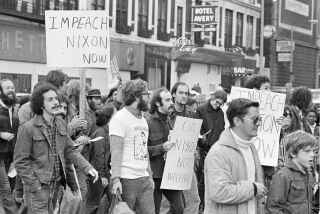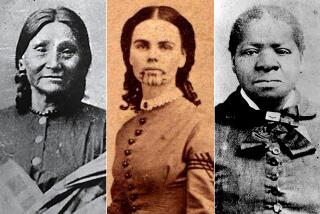BOOK REVIEWS : What if Intrepid Explorers Came to America, Once Again?
- Share via
Hello America by J. G. Ballard (Carroll & Graf: $17.95; 224 pages)
What if. . . .
What if the United States were turned into a vast wasteland by changes in the global climate resulting from the construction of a dam across the Bering Strait?
What if the desertification of America drove its whole population back to Europe, Asia, Africa and South America, leaving behind only a remnant of burnoose-clad, camel-riding aboriginals?
And what if a band of intrepid adventurers returned to America from their European exile in the 21st Century to re-enact the old saga of exploration and conquest. . . .
Well, that’s the stuff of “Hello America,” an agreeable, efficient but rarely surprising work of “speculative fiction” by J. G. Ballard, a veteran British author who is probably best known to Americans for “Empire of the Sun.” I suspect it was the success of last year’s movie version of “Empire” that prompted Ballard’s American publisher to resurrect “Hello America,” first published in England back in 1981, for a new American edition. In fact, I spotted a few hasty editorial fixes in passages where Ballard’s near-term predictions in the 1981 edition turned out to be wrong.
A Good Yarn
Ballard tells a good yarn, and he paints a vivid picture of America at the dawn of the next millennium--New York City is a desert, Las Vegas is a lush tropical forest, and all that’s left of America’s population of 300 million souls are a few bands of aboriginals. Somewhere beyond the desert wastes of Manhattan is a tantalizing but dangerous mystery--and the explorers from Europe abandon their scientific mission and set off to find a 21st Century El Dorado.
Ballard is not interested in the exotic hardware of some imagined super-civilization--he has seen the future, and it is drab and despairing. The ragtag explorers of “Hello America”--including a pair of scientists, a sea captain, and a visionary stowaway named Wayne--are drawn to a blasted version of America by the old dreams, the golden dreams. They have “an intense need to get away from a tired and candle-lit Europe with its interminable rationing and subsistence living, its total lack of any flair and opportunity.” America, even in destruction, “is the heart of everything. It was here they dreamed the purest dreams of all.”
The book has its moments of burlesque--and these are its best moments. Ballard pictures America in an era of ecological disaster and massive out-migration: “The 200-story OPEC Tower . . . dominated Wall Street, its neon sign pointing toward Mecca.” Teddy and “John-John” Kennedy reached the White House, but the abandonment of North America was overseen by a President named Brown--”a devoutly religious nonagenarian” who recited a “poignant Zen Tantra” before banning gas-powered vehicles, and who later presided over a government-in-exile in West Berlin.
And we meet various tribes of American aboriginals--the Professors of what was once Boston, the Astronauts of Florida, the Gangsters of Chicago and Detroit, the Gays from San Francisco, the Divorcees (“an all-woman tribe from Reno”), and the Executives of New Jersey and New York (who name themselves after the trademarks of long-forgotten corporate America--Heinz and Pepsodent, GM and Xerox--and who wear “old gray suits of pin-striped worsted . . . under their white burnooses.”)
The plot of “Hello America” is a simple but serviceable tale of the quest. Wayne and the other explorers are lured across the continent to the jungles of latter-day Las Vegas by the post-post-industrial signs and wonders of an evil presence--Charles Manson, the self-styled President of the United States.
The final cataclysmic encounter between Wayne, President Manson, and a whimsical inventor who very much resembles the Wizard of Oz, is the occasion for some of Ballard’s most imaginative and lyrical writing. Still, there is a certain clunky inevitability about the cinematic big finish, and one can almost imagine the final credits on the big screen.
Ballard seems much more interested in the mythic underpinnings of his tale, which is heavily freighted with unsubtle symbolism.
“Hello America” is a successful entertainment, but Ballard’s speculations are, in the end, unconvincing and unenlightening. He asks: “What if?”
All too often, I found myself responding: “So what?”
More to Read
Sign up for our Book Club newsletter
Get the latest news, events and more from the Los Angeles Times Book Club, and help us get L.A. reading and talking.
You may occasionally receive promotional content from the Los Angeles Times.









